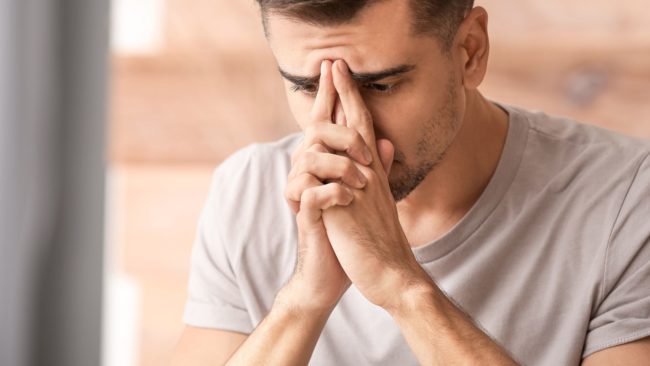
At Dad Info we have long been talking about the issues around dads’ mental health. Research shows that fathers who are depressed during the perinatal period are 47 times more likely to be a suicide risk.
Today sees what we hope will be an important step in improving the provision of care for fathers in the UK- several prominent campaigners are visiting the Houses of Parliament to talk to MPs.
Research and evidence
Dr Andrew Mayers is one of the campaigners attending the inquiry, and he spoke to us about his research and the importance of care for dads.
Dr Mayers is an academic psychologist at Bournemouth University, and researches and campaigns on perinatal mental health issues. He previously worked on mother’s mental health for 20 years. Research shows that a third of women find giving birth traumatic; the reasons for trauma during birth can be wide-ranging, but include difficult delivery, injury to the mother, health scares involving the baby or difficulty in adjusting to life with a baby.
‘It became quite clear when we started doing this work that fathers also need support,’ he says. ‘Fathers are an equal part of what goes on. We need to think about fathers- everyone from midwives to GPs. What our studies showed was fathers feeling that they weren’t being recognised as an integral part, that their fears and anxieties didn’t matter.’
The three areas that dads need support
Dr Mayers has identified 3 areas where fathers need more information and support. ‘Firstly, if a father sees his partner becoming mentally unwell following birth it is probably not something they’ve come across before. Suddenly his partner is behaving in a way he doesn’t understand,’ he says. ‘All we need to do is educate fathers on what they need to do.’
The second area that Dr Mayers has recognised is dads’ own mental health. ‘Fathers own mental health can suffer, even if their partner gets through the birth relatively well,’ he says. ‘Men don’t talk about these things, but call it as you will- postnatal depression perhaps- they’re not getting the support.’
Lastly, dads can become traumatised by witnessing the difficult birth of his baby or his partner becoming unwell.
‘If a father is in the birthing room and things go wrong, he needs information and support,’ says Dr Mayers. ‘Potentially he is seeing his wife or partner and his child get into serious difficulties. When the father is removed from that room and doesn’t know what is going on, it’s a traumatic experience.’
Steps towards change
NHS England came to Dr Mayers six years ago asking what needed to change for fathers. As a result from 2019 dads began being screened for their mental health.
The current public inquiry involves several other activists speaking about their experiences and what they feel needs to change.
‘This will be really important,’ says Dr Mayers. ‘We might be able to get changes in to get fathers the support they need through the traumatic experiences that they encounter.’
Backing up his argument to MPs will be the extensive research that Dr Mayers has worked on (see links below). ‘Teaching is one very small part of what we do- research is another large part,’ he says. ‘You can campaign as much as you like to government and the NHS about what needs to change but without the evidence provided by research they won’t listen.’
Dads’ experiences
To complete this research, fathers were asked to answer in-depth questions about the impact birth had on them. This ranged from what they witnessed their partner go through to the impact on themselves. They also reported how their confidence was affected and some said they felt like a failure.
‘What I’d like to see is investment in services so that health professionals in every locality have expertise about the mental health side of maternity,’ Dr Mayers says. ‘The money that that would save and the lives that it would save would offset the investment. Once it becomes normal practice then people will look back and wonder why we didn’t do this before. Even if we save one life it’s something.’
For information about supporting your partner with postnatal mental health issues, click here (link to Spurgeons).
If you want to talk to other dads, join our friendly forum.
To read more about Dr Mayers, click here.
Dr Mayers’ research can be viewed here:
You can find more helpful information on the Make Birth Better website.







